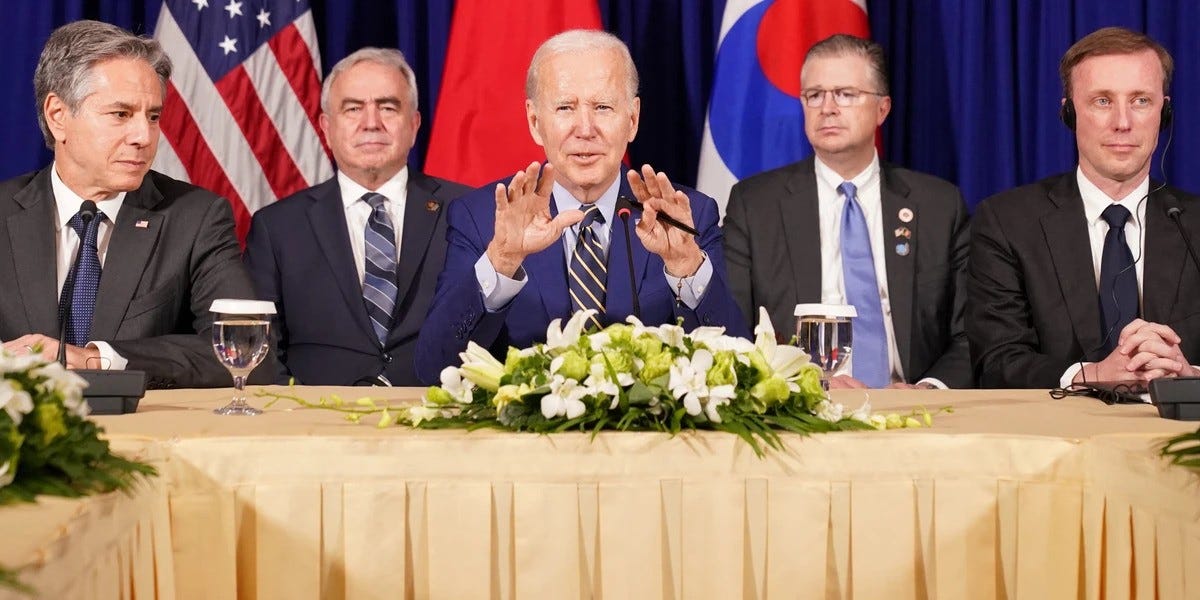Four Blind Mice: Biden, Blinken, McGurk, and Sullivan
The president and his top three advisers continue to push the Abraham Accords while denying the realities of the Gaza war
AfricaFocus Notes on Substack offers short comments and links to news, analysis, and progressive advocacy on African and global issues, building on the legacy of over 25 years of publication as an email and web publication archived at http://www.africafocus.org. It is edited by William Minter. Posts are sent out by email once or twice a month. If you are not already a subscriber, you can subscribe for free by clicking on the button below. More frequent short notes are available at https://africafocus.substack.com/notes, and are also available in an RSS feed.
Note from Editor
This article reposted below was originally published in Responsible Statecraft on May 22, 2024. For earlier AfricaFocus Notes on the war in Gaza, visit https://africafocus.substack.com/t/gaza. For a spreadsheet with links to a wide range of articles recently read and worth reading on Palestine, click here.
It would be good to say that Biden and his key advisors had finally found their “red line.” That has not yet happened, despite massive protests and unprecedented internal dissent. Among the most eloquent dissenting voices was Lily Greenberg Call, the first Jewish Biden appointee to resign.
Yesterday, May 29, According to the Washington Post
Four weapons experts said the Israeli military used a U.S.-made precision bomb in a strike that killed at least 45 people in southern Gaza on Sunday, after reviewing visual evidence provided to The Washington Post.
…
The Biden administration has not halted transfers of this munition over the course of the war. Last month, the State Department approved a transfer of more than 1,000 GBU-39/B small-diameter bombs with containers on the same day that Israeli forces bombed a convoy of World Central Kitchen aid workers in Gaza, killing seven.
DC Voters Can and Should Speak Out in the November 4 Democratic Primary
In some Democratic primaries earlier this year, anti-war activists called for voters to vote “uncommitted” as a protest against U.S. military support for Israel’s war in Gaza. In Michigan in February, the protest vote won 13%, making national headlines.
Washington, DC does not have an “uncommitted” option. But there is an option for an write-in vote on the ballot, and local activists have organized a campaign on Instagram to write in “Gaza.” As a DC resident, I support this campaign.
If you are a voter registered as a Democrat in DC, I urge you to take this option. Since DC is reliably blue, this can have no potential effect on the general election. But if there are enough votes, it can, like Michigan, make the news and register the dissent.
If you are not in DC, but have friends who are, please pass this on them. The link to the Instagram page is https://www.instagram.com/writeindc2024/ And the group has also created many educational resources to be shared at https://linktr.ee/writeindc2024
By Zeb Larson and William Minter
On May 20, the International Criminal Court announced that it was seeking arrest warrants for Israeli Prime Minister Benjamin Netanyahu, his defense minister, and three leaders of Hamas for war crimes committed in Gaza. President Biden denounced this demand, stating that, “There is no equivalence between Israel and Hamas,” and also denied that Israel was carrying out a genocide.
This is part of a long-running pattern for Biden and his advisers.
A recently implemented policy — National Security Memorandum 20 — requires regular reports to Congress on U.S. weapons supplied to countries engaged in active armed conflict to determine whether those recipients are engaging in violations of international human rights law. This year Israel was among the seven countries requiring such reports. While the evidence is overwhelming that the Israeli military is indeed guilty of such violations, the report issued this month by the Biden administration concluded that the evidence was not sufficient to justify reducing arms sales.
Instead the U.S. is sending more weapons, as the president notified Congress on May 14 of a renewed commitment of more than $1 billion. A left-wing podcast has named Biden and three key advisers who are blocking any reduction in arms or military support to Israel: Secretary of State Antony Blinken, national security adviser Jake Sullivan, and Brett McGurk, the president’s Middle East coordinator.
They are all standing firm in resisting the pressure to reduce support for Israel, despite unprecedented criticism. Annelle Sheline, a former State Department official who resigned in protest over the administration’s handling of Gaza observed that “in general, the administration seems to view Israel's military operations in Gaza as a PR issue, rather than grappling with the significant political as well as moral questions raised by Israeli actions.” Sheline had previously worked for the Quincy Institute, which publishes Responsible Statecraft.
The wave of student protests against U.S. military support for Israel to date are similar in scale to those against the South African government in the 1980s. Encampments at Berkeley and elsewhere mirror the shantytowns built on U.S. campuses, and have sprung up in a fraction of the time.
Internal dissent has been most visible in the State Department, where three U.S. diplomats have resigned and spoken out publicly. In the Department of the Interior, Lily Greenberg Call became the first Jewish Biden political appointment to resign, accusing the president of using Jews to justify his support for the war in Gaza. Almost 200 lawyers working in U.S. government posts prepared a legal brief concluding that "supplying Israel with unconditional military aid to continue its bombardment on the Gaza Strip is not only totally disingenuous, but also severely inadequate to fulfill the U.S.’s obligations to prevent and punish genocide."
Why does Biden refuse to curb the flow of offensive weapons to Israel? Peter Baker of the New York Times does not answer this question. Instead he describes differences among the president's key advisers, including Blinken, Sullivan, and McGurk, about how to engage with Netanyahu and respond to the ongoing violence, urging symbolic acts such as a delay in shipping heavier bombs.
When asked about these alleged differences, Sheline said, “I would say that although it's quite plausible that different high level figures inside the White House have different views, in practice these divisions have yet to have any impact on policy, which seems to come directly from Biden himself.”
The Biden administration is still wedded to the hope of an Israeli grand bargain with authoritarian Gulf states. This “Abraham Accords” strategy, starting during the Trump administration with Bahrain and the United Arab Emirates in 2020, aims to ensure stability in the Middle East by setting up Israel and powerful Arab states as regional policemen, excluding the Palestinians.
This combined with the entrenched support of the donor class for Israel means that Biden and company continue to cling to the Abraham Accords. To do so, however, requires denying the realities of the war in Gaza. As four willfully blind mice, Biden, Blinken, Sullivan and McGurk continue a futile chase, with Netanyahu playing the farmer's wife in the classic nursery rhyme.
Zeb Larson Zeb Larson is a writer and historian of the anti-apartheid movement based in Columbus, Ohio. He got a PhD from The Ohio State University in 2019. He writes on a wide variety of topics, including foreign policy and history.
William Minter William Minter is the editor of AfricaFocus Bulletin. Since November 2020, he has served as a senior consultant with the new U.S.-Africa Bridge Building Project. Minter’s most recent book is No Easy Victories: African Liberation and American Activists over a Half Century, 1950-2000, co-edited with Gail Hovey and Charles Cobb Jr.






